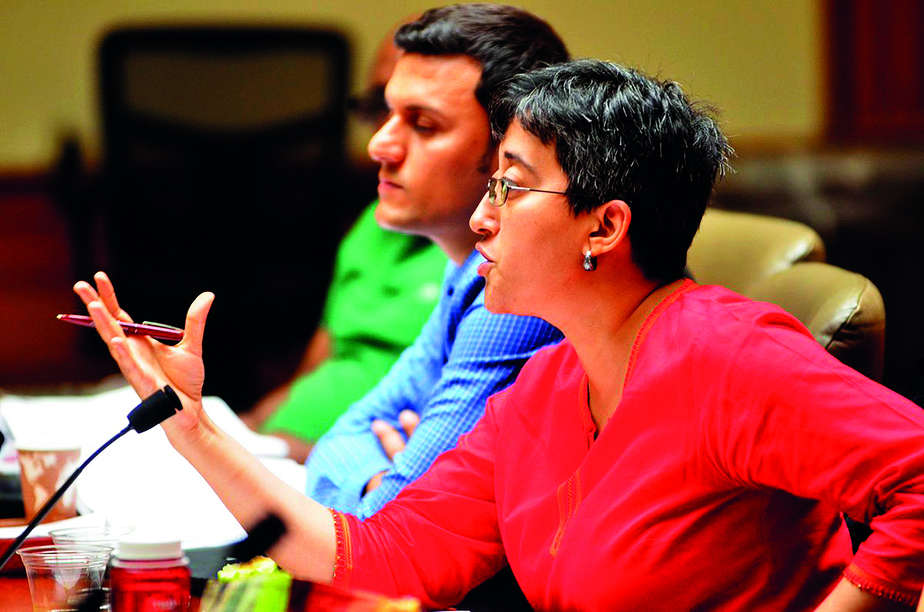THE SACKING OF ATISHI MARLENA HAS LEFT EVERYONE WITH A QUESTION: HOW CAN THE CENTRAL GOVERNMENT SACK AN ADVISOR TO THE DELHI GOVERNMENT?
The cancellation of Atishi Marlena’s appointment as advisor to Delhi Education Minister Manish Sisodia is one of those occasions when the Narendra Modi-led central government has taken direct aim at the Arvind Kejriwal government in Delhi. In the past, adverse actions against the Delhi government have been routed through the Office of the Lieutenant Governor (L-G) of Delhi. But this time, the order has come straight from the Union Ministry of Home Affairs.
The question on everyone’s minds is: how can the central government sack an advisor to the Delhi government? The short answer is: Ever since the Aam Aadmi Party (AAP) came to power in Delhi, the Bharatiya Janata Party (BJP) government via a notification in 2015 took away the Services department from the elected government and transferred it to the LG. The absurdity of not having the power to appoint, post and transfer officials in one’s own government was forced on Arvind Kejriwal by a vindictive government to scuttle the AAP’s radical agenda to reform education, health, power and water sectors. In doing so, the BJP ensured that all of Delhi’s bureaucrats answered only to the LG and not to Delhi’s ministers, because there were absolutely no repercussions of insubordination. The Delhi government, with its wings clipped, relied on young, brilliant advisors to drive policy reform.
One such advisor was Atishi: St Stephen’s topper, Masters in History from Oxford University on a Chevening scholarship and Masters in Education from Oxford University on a Rhodes scholarship. Highly educated, articulate persons like her are engaged in high positions at top institutions. The life choices Atishi made early on had brought her to AAP in 2012. Her gradual and steady rise in politics is celebrated by those of us who believe politics needs more educated professionals who can bring both casual brilliance and ideological coherence.
While Education Minister Manish Sisodia has been the public face of the Delhi government’s interventions in education, he has been backed up at every step along the way by Atishi. On many occasions, he has publicly credited Atishi for being the architect of reforms like the revival of School Management Committees (SMCs), introduction of Mega Parent Teacher Meetings (PTMs), international collaborations with Cambridge University, National Institute of Education, among others for teacher training, and so on. It has been Atishi’s quiet, behind-the-scenes labour that has resulted in the effective roll-out of every single policy envisioned in the education sector.
But Atishi has not been sacked merely because she was doing fantastic work. The sacking of Atishi is an attempt at delegitimising the person who has been fighting for restoring the prestige of Delhi’s public education system for those who have suffered official neglect at the hands of governments that worked only for private interests. It is to delegitmise the very politics of Aam Aadmi Party. Indeed Atishi successfully articulated the very essence of the contemporary character of the party. Today’s AAP is a party that practices citizenship politics – a politics that goes beyond ideological binaries of the past century and says, “Vote for us if you want good government schools.”
The credibility that Atishi as advisor lent to the government meant that a section of people who may not be interested in politics otherwise have had faith in the AAP government. Several academics, organisations from around the world saw in Atishi an ally and interface they were comfortable dealing with.
Few will credit AAP for it, but the Arvind Kejriwal government’s focus on education and healthcare has transformed the nature of politics in Delhi. Despite being surrounded by communally-charged Uttar Pradesh and Haryana that have fallen prey to BJP’s divisive agenda, Delhi has almost no place for identity politics. The BJP’s best attempts to replicate its success elsewhere have failed because the discourse has been built around government schools and hospitals. Atishi symbolises this form of citizenship politics, and that is what the BJP is attacking.
The silver lining in this entire episode has been the outpouring of public support for Atishi on social media platforms. The BJP probably does not realise this, but absolutely nothing is going to stop Atishi from continuing to advise the minister. Each time the BJP goes out of its way to persecute the Delhi government, it results in the AAP fighting back harder. I suspect the same will happen this time as well. The AAP is engaged in an epic political fight for changing the way governments work in this country and the BJP would do well to not underestimate Arvind Kejriwal’s tenacity and determination.
Full disclosure: Akshay Marathe is National Joint Secretary of the Aam Aadmi Party. He currently works with the Delhi Government on education policy and has closely worked with Atishi Marlena
This article has been re-published with the permission of Newslaundry. Read the original article on www.newslaundry.com





